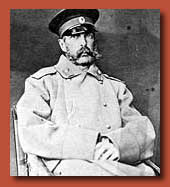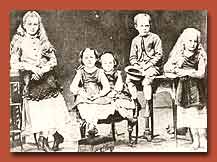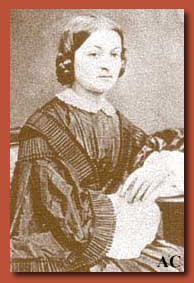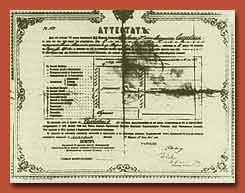|

 Nation
and Family Nation
and Family
 PRISONER IN CHAINS. That is what Poland seemed like to Maria
Sklodowska. Manya, as she was affectionately called, learned to
be a Polish patriot from her parents, Bronislawa and Vladislav Sklodowski.
At the time of Maria's birth in Warsaw on November 7, 1867, Poland
had not been an independent country for most of a century. It had
been divided up among Austria, Prussia, and czarist Russia.
PRISONER IN CHAINS. That is what Poland seemed like to Maria
Sklodowska. Manya, as she was affectionately called, learned to
be a Polish patriot from her parents, Bronislawa and Vladislav Sklodowski.
At the time of Maria's birth in Warsaw on November 7, 1867, Poland
had not been an independent country for most of a century. It had
been divided up among Austria, Prussia, and czarist Russia.
Warsaw was in the part
of Poland controlled by the czar, who hoped to stamp out Polish nationalism
by keeping the people ignorant of their culture and language. But
Polish patriots were determined to regain control of their nation.
As educators, Maria's parents did their best to overcome restrictions
placed on them by their Russian supervisors. |

|
| Czar Alexander II preferred to wear a military
uniform. When the Czar was assassinated by revolutionary students
in 1881, Manya and her best friend Kazia celebrated by dancing
around the desks in their classroom. |
|
|
The birth of Manya, her fifth child, led her mother to resign her
position as head of a school, where the family had resided until
then. They moved to a boys' high school, where Vladislav taught
math and physics and earned a good salary. Eventually, however,
the Russian supervisor in charge of the school fired him for his
pro-Polish sentiments.
“Constantly
held in suspicion and spied upon, the children knew that a single
conversation in Polish, or an imprudent word, might seriously
harm, not only themselves, but also their families.”
--Marie Curie
|
|
MAP
of Russian Poland

|
| The five Sklodowski children.
From left to right: Zosia died of typhus; Hela became an educator;
Maria, twice a Nobel laureate; and Józef and Bronya, physicians.
“We all had much facility for intellectual work,”
said Marie. (photo ACJC) |
|
 |
| Marie was ten years old when her mother died
in May 1878. As an adult Marie remembered it as “the first
great sorrow of my life,” which “threw me into a profound
depression.” (photo ACJC) |
|
 S
HER FATHER WAS FORCED into a series of progressively lower academic
posts, the family's economic situation deteriorated. To help make
ends meet they had to take in student boarders. Maria was only eight
when her oldest sister caught typhus from a boarder and died. That
death was followed less than three years later by the death of Madame
Sklodowska, who lost a five-year battle with tuberculosis at the
age of 42. The surviving family members--Professor Sklodowski; his
son Joseph; and his daughters Bronya, Hela, and Maria--drew closer
to one another. S
HER FATHER WAS FORCED into a series of progressively lower academic
posts, the family's economic situation deteriorated. To help make
ends meet they had to take in student boarders. Maria was only eight
when her oldest sister caught typhus from a boarder and died. That
death was followed less than three years later by the death of Madame
Sklodowska, who lost a five-year battle with tuberculosis at the
age of 42. The surviving family members--Professor Sklodowski; his
son Joseph; and his daughters Bronya, Hela, and Maria--drew closer
to one another.
Although Sklodowski
would never forgive himself for losing the family savings in a bad
investment, the children honored him for nurturing them emotionally
and intellectually. On Saturday nights he read classics of literature
to Maria and her siblings. He also exposed them to the scientific
apparatus he had once used in teaching physics but now kept at home, since the
Russian authorities had eliminated laboratory instruction
from the Polish curriculum.
|
“I
easily learned mathematics and physics, as far as these
sciences were taken in consideration in the school. I found
in this ready help from my father, who loved science....Unhappily,
he had no laboratory and could not perform experiments.”
|
|
|
Manya was the star
pupil in her class. Her personal losses did not impede her academic
success, but the pleasure of being awarded a gold medal at her high
school graduation in 1883 was blunted because it meant shaking the
hand of the grandmaster of education in Russian Poland. After graduating
at 15, Manya suffered a collapse that doctors thought was due to
fatigue or "nervous" problems -- today it might be diagnosed
as depression. At her father's urging Manya spent a year with cousins
in the country. A merry round of dances and other festivities, it
would be the only carefree year of her life.
|
 |
| Manya's secondary school
diploma. She later recalled “always having held first
rank in my class.” (photo ACJC) |
|
|

